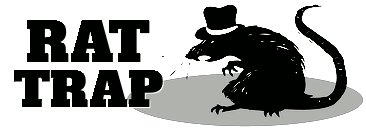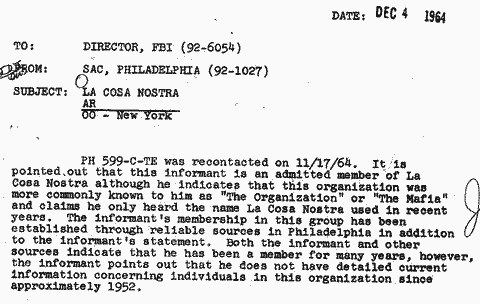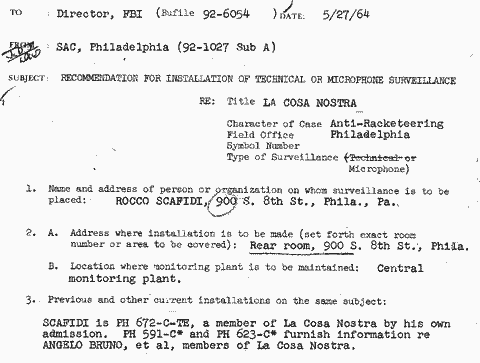"La Cosa Nostra you know - it's going to crumble someday."
- Harry Riccobene [1]
[Editor's note: Following is an updated version of an article that originally appeared in the April 2012 issue of Informer: The History of American Crime and Law Enforcement.]
By the early 1960s, the Federal Bureau of Investigation was able to persuade two members of the Philadelphia Crime Family to reveal confidential information about La Cosa Nostra. [2] The informants were the sons of prominent LCN members who could trace their crime family connections to the 1920s. They provided federal agents with an inside look at the history, structure and membership of the Philadelphia Crime Family back to its earliest days.
First informant profile
Sometime in 1963, the FBI convinced a longtime member of the Philadelphia Crime Family to break his code of silence and to share confidential information about La Cosa Nostra. The FBI had been developing him as a source for more than ten years before he began to open up.
The informant was first identified as a member of "The Organization" in the 1940s, during an investigation into organized crime in Philadelphia and across the United States. [3] "The Organization" and "Greaser Gang" were local names given to the LCN family in Philadelphia. The informant was described as a killer who had been responsible for numerous "Organization executions."
The FBI agent who got the informant to talk was Special Agent David E. Walker from the Philadelphia office. Walker and the informant first met in 1950. The informant was incarcerated at the federal penitentiary in Lewisburg, Pennsylvania, and Walker would visit him periodically. [4] The informant never revealed anything confidential in the early years, but he did grow to like Walker because Walker showed him "respect". [5] Walker never asked him a direct question and never let him think of himself as an informant. This made a positive impression on the informant who had a high opinion of himself.
After each visit, Walker was able to get the informant to talk more "freely" about his criminal history until he began to open up in a meaningful way around 1963. [6] The informant was assigned the symbol code of "PH-599-PC" to protect his identity. [7]
(The informant symbol code is the unique identifier used in every FBI document to track information about or supplied by a secret informant, without compromising his anonymity. By compiling all the documents that use symbol code "PH-599-PC," we can create an informant profile and determine his identity.)
The informant told Walker that the organization allows its members "to talk with law enforcement officials if 'you don't hurt anyone.'" [8] He said he wouldn't give the FBI any "specific details regarding crimes" that could be used to make a criminal case against anyone. The informant seems to have stuck to this personal code throughout his relationship with the FBI. [9]
The informant said he had been "'around the Organization' since approximately 1929." [10] He boasted that "he [knew] more concerning the general background of the organization than do most members." [11] His knowledge of the organization was based on "personal observations during many years of activities in the Italian underworld as well as conversations with other persons who have been members ... for a longer period of time than himself."
He did say that he wasn't "in possession of all current developments." [12] Because he was incarcerated and "out of contact with organized Italian underworld activities for several years," the informant said he was unaware of the current "membership, control and policies." [13] He said he could only give relevant information up to the year 1952. [14]
The known biographical details of the informant and the information he supplied track closely to only one Philadelphia Crime Family member.
Prime Suspect: Harry Riccobene
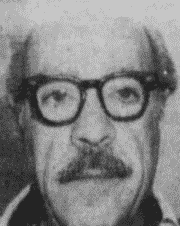
Harry Riccobene
Harry Riccobene was a longtime member of the Philadelphia Crime Family. [15] Born in 1910 at Sicily, Riccobene came to the United States as a child with his parents and settled in Philadelphia. His father, Mario Riccobene, had been a Mafia member in Sicily. [16] He became an original member of the newly reorganized Philadelphia Crime Family in 1920. [17]
Harry Riccobene was known as "the Hump" because he was short and had been born with a curved spine that left him with a bent posture. Despite being an unimposing figure, Riccobene was a formidable racketeer from his earliest days.
As a young man, Riccobene was active as a loanshark, a bookmaker, a bootlegger and anything else that turned a profit. He had multiple convictions for narcotics trafficking going back to the 1930s. He also had a reputation as a hitman. [18] Law enforcement once described him as "the Number 1 Hoodlum Mobster in Philadelphia."
Riccobene said he made his own way into the Philadelphia Crime Family without his father's influence. In a jailhouse interview in the 1990s, Riccobene admitted that he was initiated into LCN in 1927. He was sixteen years old. [19]
Harry Riccobene was a rising power in the Philadelphia Crime Family until he was convicted for heroin trafficking in the 1950s and given a stiff prison sentence. His long incarceration away from the streets would leave him unable to speak confidently about activities in the Philadelphia underworld after 1952.
It was during this long prison sentence that FBI agent David E. Walker began to develop Riccobene as a source. It began to pay off in 1963 when Riccobene stopped speaking in generalities and began to name names.
Two things happened in 1963 that may have made Riccobene more forthcoming:
In March that year, the Pennsylvania State Pardons Board voted against commuting his prison sentence. [20] There had been the chance that Angelo Bruno's political contacts would be able to help Riccobene get out early. [21] [22] Instead of a trip home, he had to serve out the remaining ten plus years of his sentence.
And, perhaps more important, LCN was no longer a secret. The American public had gotten to learn all about it after Joseph Valachi became the first LCN member to publicly reveal details about the criminal organization. What was once hidden, was now in the open.
Riccobene enlightens
Harry Riccobene gave federal agents a history lesson on the Sicilian Mafia and the Philadelphia Crime Family. This kind of information was the bread and butter of the FBI in the early post-Valachi period. Every FBI office was in a race to develop as many member-informants as possible who could give a breakdown on the history and membership of the local LCN crime family.
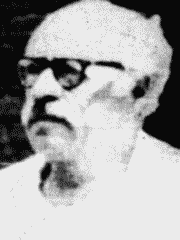
Harry Riccobene
Riccobene outlined the structure and the rules every LCN member had to follow. [23] Much of the general information was similar to what New Yorkers Joseph Valachi and Gregory Scarpa were telling agents.
He said the organization came together hundreds of years ago in Sicily when peasants banded together to oppose cruel land holders. The organization became powerful in its own right and the land holders used it as a private police force to fight robbers and recover stolen property. Similar organizations with different names operated in different parts of Italy.
According to Riccobene, the Neapolitan version of the organization was an out-and-out criminal enterprise from the start and was involved in murders, extortion and blackmail. This organization was called the Camorra. The criminal societies crossed the Atlantic and took root in Italian and Sicilian immigrant communities in the United States. Over time, the different organizations in the U.S. were "absorbed" by the Sicilian organization and became one. Riccobene said the American crime families didn't answer to Sicily.
Riccobene said the Philadelphia Crime Family was known locally as "The Greasers" or "The Organization." [24] He said he had never heard it called "La Cosa Nostra" until 1963. He said the main purpose of the organization was "self-preservation."
Riccobene identified all the crime bosses that he knew of, beginning with Salvatore Sabella and John Avena. He said they were both demoted for using poor judgement. [25] He said he was "surprised" to learn in prison that Angelo Bruno had been made boss, because he had only been an inducted member for a short time. Riccobene thought Bruno lacked the "necessary qualifications for leadership." [26] Riccobene later said that he had declined the opportunity to become boss himself in the 1950s. [27] He said it wasn't worth the trouble.
Riccobene was the first member-informant in Philadelphia to identify crime family members and associates, along with the different capodecinas and crews. [28] He said gambling was the most common illegal activity for members. [29]
Speaking in the early 1960s, Riccobene said the quality of new members had declined. He said membership requirements had been lowered in recent years and this had left him disillusioned. [30] Individuals were now being admitted into LCN who were only good for making money. He said the Gallo brothers in New York City were the kind of individuals who should have never been admitted in the first place.
He said Stefano Magaddino, the LCN boss in Buffalo, was well-respected and had always been seen as a "peacemaker." He said it would make sense if he was used to help bring a peaceful settlement to the Gallo-Profaci conflict. [31]
He was surprised when he heard that individuals close to Gambino Crime Family member Carmine Lombardozzi had beat up an FBI agent. LCN members were obliged to respect law enforcement officers. He said he expected the crime family to punish those responsible. [32] He said members of the press could become targets of a mob "hit" if they didn't stop reporting what Riccobene considered to be inaccurate stories about LCN members.
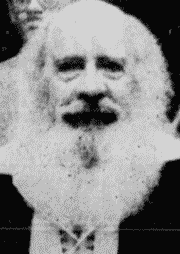
Harry Riccobene
Riccobene was the first member-informant to confirm the existence of a LCN group in Baltimore. He told agents that the local Italian underworld was controlled by "Don Luigi", who reported to a crime family in New York City. [33] The FBI would learn later from another member-informant that the Baltimore group was part of the Gambino Crime Family.
He told federal agents that there had never been a separate LCN crime family in Newark, New Jersey or Pittston, Pennsylvania. [34] Despite the proximity of the two cities to Philadelphia, Riccobene had never heard of them.
Riccobene said he was "violently" opposed to the induction of Mario Riccobene, his half-brother, into the LCN. Mario Riccobene looked after his rackets while he was incarcerated. It's unclear if he was trying to protect Mario from the unsavory aspects of LCN or if he wanted to keep his half-brother beholden to him. Riccobene also opposed the induction of another underling, Raymond "Long John" Martorano. Both men were later murdered by the mob.
The publicly available FBI reports that contain information supplied by Riccobene largely dry up after 1964. Riccobene was described as having only "limited" contact with the FBI by 1968. [35]
Riccobene's last years
After Harry Riccobene was released from prison in 1975, he went back to his old rackets in Philadelphia. He led a crew of gangsters who engaged in gambling, loansharking, operating vending machines and dealing drugs - illegal activities Riccobene had been doing for fifty years. His notoriety grew in the 1980s when he tangled with Nick Scarfo, the new boss of the Philadelphia Crime Family and a man he once dismissed as a "kid."
The Riccobene-Scarfo War started after Riccobene refused Scarfo's demands to kick up more money to him to operate in Philadelphia. Always independent, Riccobene had paid only a token amount to Angelo Bruno in the past. Scarfo would eventually come out on top in the conflict but not before bodies would start piling up on both sides.
Harry Riccobene survived being shot five times during the war but he couldn't survive the betrayal of his half-brother, Mario Riccobene, who testified against him in court and helped convict him of murder. In 2000 at age eighty-nine, he died in prison, where he had spent most of his adult life.
In the last years of his life, Riccobene agreed to be publicly interviewed. He revealed personal details about himself and his criminal life that were similar to the kind of historical information revealed years earlier to the FBI by informant "PH 599-C-TE."
Second informant
In early 1964, a second LCN member-informant, known as "PH 672-C-TE," with equally deep ties to the Philadelphia Crime Family, began to share confidential information. [36] He would go further than Harry Riccobene ever did to help the FBI take down the mob.
The first disclosure he ever made was about a low-level hood named Rocco Scafidi and the night he was inducted into the Philadelphia Crime Family.
Rocco Scafidi
Rocco Scafidi was born in 1913, the son of Sicilian immigrants. His father was Gaetano "Big Tom" Scafidi, a longtime crime family capodecina who had arrests for counterfeiting, arson and bombing. "Big Tom" Scafidi and his brother, Joseph, were said to be founding members of the Philadelphia Crime Family when it was reorganized in 1920. [37] Sam Scafidi, Rocco's brother, was also a member.
According to the informant, Rocco Scafidi was inducted into the Philadelphia Crime Family about 1950. [38] The ceremony took place at the Casablanca Night Club, in Camden, New Jersey. [39] His sponsor was his uncle, Joseph Scafidi. The purpose of the sponsor was to hold the new member accountable if he ever got of line. [40] Also inducted that evening were Anthony Perella and Anthony Maggio.
All the leading members of the crime family were present at the ceremony including boss Joseph Ida, underboss Marco Reginelli, consigliere Joseph Rugnetta and many capodecinas including Gaetano Scafidi and Antonio Pollina. [41]
Joseph Scafidi, the informant's sponsor, made a short speech to the senior members supporting Rocco Scafidi's membership. Antonio Pollina was randomly selected to be his "godfather." [42] Pollina was acting boss for a short time in the late 1950s.
During the ceremony, Pollina pricked Scafidi's trigger finger and collected the blood on a tissue. There was a gun on the table. The blood-stained tissue was then lit on fire and placed in Scafidi's hands. Marco Reginelli then told Scafidi to repeat after him, "If I go against you, I will burn as the paper burns," as he juggled the lit tissue. The informant understood this to mean if he broke the oath and betrayed the secrets of the organization, he would die by the gun and burn like the paper. A religious card (santino) is never used in the ceremony in Philadelphia. [43] According to the informant, the purpose of the organization is to "give protection to ourselves, that is, the members and their families." [44]
The mobster who provided all this information was identified in FBI reports as "PH 672-C-TE." An examination of other FBI reports produced by the Philadelphia office during this period shows the informant assigned that symbol code was none other than Rocco Scafidi himself. [45]
Reinstated
FBI documents show Rocco Scafidi began to cooperate sometime between December, 1963 and May, 1964, while he was incarcerated at the Philadelphia House of Detention. [46] [47] Scafidi was there awaiting trial for writing fraudulent cheques, or as he put it, "bad paper." [48]
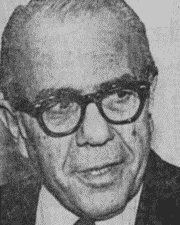
Angelo Bruno
Scafidi was sprung from jail after Angelo Bruno used his political contacts to get the charges reduced. Bruno did it as a favour for Phil Testa and Sam Scafidi. Privately, Bruno called him "mentally sick" and said it wasn't worth the effort because Scafidi "will straighten out for a while and go back doing it again." [49] It cost Bruno $3,000 to get him out. [50] The first thing Rocco Scafidi did after he got out of jail was to go see the FBI. [51]
Rocco Scafidi said that soon after he became a member in 1950 things went off the rails. He was accused of misappropriating crime family funds and committing an unauthorized murder. [52] Marco Reginelli, the underboss, and the leader of the Calabrian faction of the Philadelphia Crime Family, wanted to kill him. Scafidi, a Sicilian, was saved through the intercession of the Sicilian faction of the crime family and Guiseppe Traina, powerful LCN member from New York City and old family friend. [53] Scafidi said there has always been friction between the two factions. [54]
Instead of being killed, Scafidi was put on "probation." He was excluded from all crime family business until he earned his way back in. Scafidi ended up being on the shelf for nearly ten years. He was readmitted through the influence of Angelo Bruno, the new boss. [55] He was reinstated at a ceremony at the Buckeye Club in Philadelphia during October of 1960. [56]
The ceremony was presided over by Angelo Bruno. Scafidi's sponsor this time was Ignazio Denaro, the new underboss. All the senior members of the crime family were present including Joseph Rugnetta, Philip Testa, Pasquale Massi, Antonio Pollina and Joseph Scafidi. [57] Also inducted were Frank Monte and Frank Narducci. Scafidi wasn't required to swear the oath again like Monte and Narducci.
After the ceremony, they celebrated at an oyster restaurant where Scafidi was reintroduced to fellow LCN members with the words (in Italian), "I would like you to meet a friend of ours." Scafidi said his uncle wept for joy.
Scafidi gets busy
One of the first things the FBI did after Rocco Scafidi was released from jail was to install a listening device in his apartment. [58] The purpose of the bug was to "check the movements and accuracy of informant's information and to afford coverage of meetings informant has with other La Cosa Nostra members." The FBI also wanted to confirm Scafidi was an inducted member like he claimed. Harry Riccobene had told the FBI that he doubted Scafidi was a member. [59]
The secret bugging operation in Scafidi's apartment didn't produce much in the way of usable intelligence and was discounted shortly afterwards, but it did produce some unexpected levity. As part of his informant agreement, Scafidi was under strict rules to only use an outside line if he wanted to contact his FBI handler. Scafidi ignored protocol onetime and contacted his FBI handler from his bugged apartment. The call was intercepted by the listening device and the agent's conversation with Scafidi ended up appearing in an FBI report. [60]
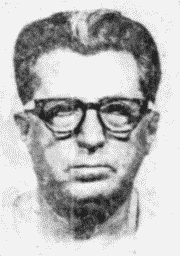
Ignazio Denaro
After he got of jail in 1964, Scafidi decided to open a luncheonette, something he had done in the past. Angelo Bruno had insisted he get a legitimate job "to satisfy probationary requirement." He had been working as a truck diver. [61]
The luncheonette was next door to a barbershop frequented by Angelo Bruno and his underboss Ignazio Denaro. [62] They discussed LCN business there.
The FBI's Philadelphia office came up with a plan, unbeknownst to Scafidi, to install secret listening devices in the building to record conversations in the luncheonette and in the barbershop next door.
The Philadelphia office proposed giving Scafidi a sum of $300 to open the luncheonette and then $325 monthly for his cooperation. FBI headquarters nixed the plan over security concerns.
The FBI's Philadelphia office used cutting edge investigative techniques to help gather intelligence on LCN members. Some of the methods had rarely, if ever, been used before in an organized crime investigation.
For example, the FBI once placed a listening device in a vehicle used by Angelo Bruno to record his conversations. [63] This was decades before the FBI used a listening device in the vehicle of Lucchese Crime Family boss Antonio Corallo to capture his incriminating conversations.
The FBI used even more experimental methods with Rocco Scafidi. They equipped him to wear a miniature recording device to record his meetings with LCN members. The recorder was a bulletproof way to gather intelligence and confirm everything the informant was being told, independently of his word. It came with great risk to Scafidi, but according to the FBI, he was "fully cognizant of the potential dangers involved." [64]
The first time Rocco Scafidi agreed to wear the recorder was during a visit to see his godfather and former boss, Antonio Pollina. [65] He complained to Scafidi that everybody in the crime family ignored him and treated him like a pariah. Pollina did say that he was the individual who made Bruno a capodecina. This would mean Bruno was made boss only a year after he was made capodecina.
Another time, he wore it to record his conversation with Philadelphia Crime Family member Ernst Perricone and gather more "detailed information concerning activities of this group". [66]
The real prize for the FBI was to record an induction ceremony of new members. The FBI thought they had their chance in 1964 when Rocco Scafidi was invited to attend an induction ceremony for new members of the Philadelphia Crime Family. [67] The FBI convinced Scafidi to wear a miniature recording device to the ceremony. This would have been the first time law enforcement had ever recorded such an event and would have been a major coup for the FBI. Unfortunately for the FBI, the meeting was canceled and Scafidi wasn't able to record the ceremony. [68]
Scafidi comes clean
After Scafidi was released from jail, he was in almost daily contact with the FBI, either in person or through listening devices secretly placed in his apartment or place of business. [69] Over the course of many interviews, he told the FBI everything he knew about LCN.
Scafidi said the first real boss of the Philadelphia Crime Family was Salvatore Sabella. Sabella was appointed in 1920 by Guiseppe Traina of the Gambino Crime Family. Traina has been a consultant to the crime family ever since. [70]
Some of the original crime family members were his father and uncle, Gaetano and Joseph Scafidi, Dominick Festa, Frank Barrale, Marco Reginelli, Antonio Pollina, Michael Maggio, John Scopelliti and Mario Riccobene. [71] Before 1920, the Italian-American criminal element in Philadelphia operated more like the "Black Hand." Scafidi said in the early days the Philadelphia Crime Family had no underbosses or capodecinas; that came later under Joseph Bruno in the 1930s. [72]
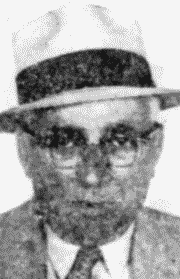
Rugnetta
Philadelphia had Calabrian and Sicilian factions. He said Guiseppe Rugnetta became underboss for the Calabrians and Ignazio Denaro handled the Sicilians. [73]
Scafidi said members paid yearly dues of $24. Members contributed more if they had "made a score." The money was used to buy price protection, political and judicial favors, and pay for court costs. [74] The Philadelphia Crime Family and every other crime family contributed money to a "kitty" that the Commission used to pay for expenses. [75] For example, the kitty was used to send money to former Philadelphia Crime Family boss Joseph Ida in Italy.
The name of the organization had changed over the years. When Scafidi was first inducted in 1950, Joseph Ida told him the name was the Mafia. Scafidi said that when he was reinstated into the organization in 1960, Angelo Bruno said it was called La Cosa Nostra. [76] [77]
Scafidi agreed with Riccobene that illegal gambling was the most common activity for LCN members. Illegal card and crap games, and loansharking were also big. [78]
Scafidi said a new member today doesn't have to "prove himself." He wasn't specific about what he meant by that but he implied that new recruits aren't require to kill like in the past. [79] He also said that Harry Riccobene was trying to "blackball" proposed member Frank Sindone for some unknown reason. [80]
Scafidi said capodecina Pasquale Massi had declined the top spot before Angelo Bruno took the job. [81] He said Massi was later arrested for sodomy and attempting to bribe a law enforcement officer. [82] Scafidi expected the organization would kill him or force him to commit suicide.
According to Scafidi, Angelo Bruno and his underboss, Ignazio Denaro don't get on. [83] Denaro wanted Bruno to resign as boss for bringing too much FBI scrutiny onto the crime family. Denaro had reportedly gone behind Bruno's back and complained about him to the Commission members in New York City. Nothing came of it because Bruno had the full support of Carlo Gambino.
Senior members of the Philadelphia and Gambino Crime Families operated an illegal lottery. The lottery profits were distributed to members across state lines which violated federal laws. [84]
Scafidi revealed the Philadelphia Crime Family had a secret burial ground in New Jersey for people murdered decades ago by the mob. [85] Scafidi's father and uncle were allegedly prolific hitmen, so it's entirely possible they had buried victims there. [86]
Misinformation
Given the vastness of a national criminal organization like LCN, not everything Rocco Scafidi told the FBI was accurate. For example, Scafidi told agents that Russell Bufalino, the boss of a LCN crime family in Pittston, Pennsylvania, was a capodecina in the Lucchese Crime Family. [87] He said Bufalino used to belong to the same crime family as Frank Costello until Thomas Lucchese took it over. [88]
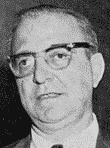
Bufalino
So for a few years, FBI files carried Russell Bufalino as a Lucchese Crime Family member, despite assurances from a New York City member-informant, who had actually met him at the Apalachin Meeting, that he operated his own separate crime family. [89]
The FBI's Philadelphia office had such confidence in the reliability of Scafidi's information that it urged FBI headquarters not "to go on record saying saying there is such a thing as the 'Bufalino Family' until such time as additional corroborating intelligence information is available." [90] Pittston was only a hundred miles away from Philadelphia, but both Scafidi and Harry Riccobene were unaware of the Bufalino Crime Family.
Scafidi was also behind the bad Intel that Carl "Corky" Civella, the brother of Kansas City Crime Family boss, Nick Civella, was taking over the Genovese Crime Family after the death of Vito Genovese. He said Civella was being placed on the Commission. Scafidi told the FBI that he learned this information from Philadelphia Crime Family capodecina John Cappello, who heard it from the "horse's mouth." [91]
The available FBI documents related to Scafidi fall off at the end of the 1960s, so we don't know what he told law enforcement afterwards.
Rocco Scafidi died May 25, 1983. He's buried in Phoenix, Arizona.
Two different informants
Harry Riccobene and Rocco Scafidi highlight the two different types of sources that the FBI used to gather intelligence against La Cosa Nostra. Scafidi went all in with the FBI, turning against everyone including Angelo Bruno, the individual who had gotten him out of jail and reinstated his membership. He went to any length to incriminate his associates, even to the point of wearing a secret recording device on people who looked out for him.
Riccobene appears never to have tried to hurt anyone. Later in life he could have publicly turned on his associates to help get himself a reduced prison sentence. Instead, he lived by his personal code and paid a steep price. Nonetheless, perhaps, he was fooling himself to think he could share confidential information with the FBI and still regard himself as a faithful LCN member.
Harry Riccobene and Rocco Scafidi
In 1964, Nick Scarfo, Philip Testa, Harry Riccobene and Rocco Scafidi came together at the Philadelphia House of Detention. [92] All four men were briefly detained at the same facility while facing unrelated charges.
Rocco Scafidi would tell the FBI that Philip Testa, Nick Scarfo and Harry Riccobene were considering a "hit" on underboss Ignazio Denaro. [93] The three men were afraid Denaro might flip if he was convicted at his upcoming extortion trial. [94] (It was probably in the back of Testa's mind that he might replace Denaro as underboss.)
The FBI considered telling Denaro about the plot in the hope of getting him to cooperate but it's unclear if they contacted him. He was eventually acquitted. Denaro remained official underboss until his death in 1970.
The FBI later approached Riccobene to see if he would admit knowledge of the plot. (The FBI was careful not to reveal details of the plot to protect Scafidi.) In a roundabout way, the FBI thought if they brought up Denaro's name, Riccobene might volunteer information about the "hit." But true to his personal code, Riccobene didn't disclose any knowledge of the "hit" or corroborate any details. Unlike Scafidi, Riccobene only told agents that he wasn't certain Denaro would be able to "stand up" to a long prison sentence. [95]
Riccobene did tell the FBI that he thought Scafidi was an "embarrassment" and "too radical" while Scarfo was "just a kid." [96] He said Testa was "a nice guy who is rather quiet." [97] He added that Testa had become close to Angelo Bruno recently and had "hitched his wagon to a good star."
Notes
1 FBI, "PH 702-C*", Philadelphia Office, July 16, 1964, NARA Record Number 124-10287-10245 Riccobene in conversation with Rocco Scafidi and Phil Testa at the Philadelphia House of Detention. Later repeated by Scafidi and intercepted by an FBI listening device.
2 FBI, La Cosa Nostra, Philadelphia Office, August 22, 1968, NARA Record Number 124-10297-10120; FBI, La Cosa Nostra, Philadelphia Office, September 11, 1967, NARA Record Number 124-10293-10351 The FBI would have at least five more unidentified members under development by 1967.
3 FBI, The Criminal "Commission", Philadelphia Office, January 17, 1963, NARA Record Number 124-10217-10118
4 FBI, Angelo Bruno, Philadelphia Office, April 28, 1964, NARA Record Number 124-10211-10353; FBI, Angelo Bruno, Philadelphia Office, May 23, 1961, NARA Record Number 124-10214-10127. He was also incarcerated at the state correctional facility in Philadelphia
5 Walker worked in the FBI's Philadelphia office from 1944-1966.
6 Morello, Celeste A., Before Bruno & How He Became Boss: The History of the Philadelphia Mafia, Book 3: 1946-1959, George H. Buchanan Printing Company, 2005, p 49. Years later, the informant remarked how much the FBI already knew about him. In conversations with Walker, he never denied being a Mafia member "because they [FBI] know everything."; FBI, La Cosa Nostra, Philadelphia Office, July 21, 1964, NARA Record Number 124-10208-10403. The source for much of the early information was an unidentified associate who cooperated between the 1940s until his death about 1960. He claimed he was invited to join the organization by Joseph Girgenti but was blackballed because he had once been a carabinieri in Calabria. The source could be Lorenzo D'Amore.
7 The informant symbol code has three parts: 1) "PH" refers to the Philadelphia office. It means the informant is handled out of there; 2) "599" is the unique informant number used only by him in Philadelphia; 3) "C" indicates he's considered a criminal informant. His status would be upgraded later to "C-TE", meaning "Top Echelon," or a premier informant.
8 FBI, La Causa Nostra, Philadelphia Office, May 14, 1963, NARA Record Number 124-10284-10246.
9 FBI, La Cosa Nostra, Philadelphia Office, May 25, 1964, NARA Record Number 124-10286-10371. According to the FBI, the information furnished only "information of value and interest concerning Organization leadership and membership of the Italian underworld." The statue of limitations had expired on any crimes that he reported.
10 FBI, La Cosa Nostra, Philadelphia Office, May 25, 1964, NARA Record Number 124-10286-10371. This appears to be the first time he admitted to the FBI that he was an inducted LCN member.
11 FBI, La Causa Nostra, Philadelphia Office, May 14, 1963, NARA Record Number 124-10284-10246.
12 FBI, La Causa Nostra, Philadelphia Office, May 14, 1963, NARA Record Number 124-10284-10246.
13 FBI, La Cosa Nostra, Philadelphia Office, May 25, 1964, NARA Record Number 124-10286-10371.
14 FBI, La Cosa Nostra, Philadelphia Office, December 4, 1964, NARA Record Number 124-10217-10170.
15 FBI, Charles Tourine, New York Office, December 23, 1969, NARA Record Number 124-90096-10293.
16 Before Bruno & How He Became Boss, p. 29-30. Mario Riccobene (1885-1954) came from a long line of Mafiosi.
17 FBI, La Cosa Nostra, Philadelphia Office, September 11, 1967, NARA Record Number 124-10293-10351.
18 Before Bruno & How He Became Boss, p. 28.
19 Morello, Celeste A., Before Bruno: The History of the Philadelphia Mafia, Book One: 1880-1931, 1999, p. 48.
20 FBI, Angelo Bruno, Philadelphia Office, June 26, 1963, NARA Record Number 124-10283-10467.
21 FBI, Angelo Bruno, Philadelphia Office, March 26, 1963, NARA Record Number 124-10283-10395.
22 FBI, La Cosa Nostra, Philadelphia Office, May 25, 1964, NARA Record Number 124-10286-10371; FBI, Angelo Bruno, Philadelphia Office, April 3, 1962, NARA Record Number 124-10219-10060. By 1962, Riccobene had developed a "rift" with Angelo Bruno over the joint ownership of a vending machine business. Riccobene had tried to sever his business relationship with Bruno. He felt Bruno's notoriety was hurting his chances to have his prison sentence commuted. (The source of this information was likely Bruno's business manager Ralph Schwartz "PH 614-C-TE")
23 FBI, La Causa Nostra, Philadelphia Office, May 14, 1963, NARA Record Number 124-10284-10246.
24 FBI, La Cosa Nostra, Philadelphia Office, May 25, 1964, NARA Record Number 124-10286-10371. The report indicated that the criminal society was also referred to locally as "The Combination" and "The Syndicate."
25 FBI, La Cosa Nostra, Philadelphia Office, December 13, 1963, NARA Record Number 124-10212-10432. Sabella got caught up in a murder; FBI, La Causa Nostra, Philadelphia Office, May 14, 1963, NARA Record Number 124-10284-10246. Avena was later murdered.
26 FBI, La Cosa Nostra , Philadelphia Office, December 13, 1963, NARA Record Number 124-10212-10432.
27 This must have been in the early 1950s during the brief period when he was out of prison.
28 FBI, La Cosa Nostra, Philadelphia Office, December 4, 1964, NARA Record Number 124-10217-10170.
29 FBI, La Cosa Nostra, Philadelphia Office, August 22, 1968, NARA Record Number 124-10297-10120.
30 FBI, La Causa Nostra, Philadelphia Office, May 14, 1963, NARA Record Number 124-10284-10246.
31 FBI, La Cosa Nostra, Philadelphia Office, December 13, 1963, NARA Record Number 124-10212-10432.
32 FBI, La Causa Nostra, Philadelphia Office, May 14, 1963, NARA Record Number 124-10284-10246. Lombardozzi was demoted from capodecina to soldier. This demotion may have played a part in his later decision to cooperate with the FBI.
33 FBI, La Cosa Nostra, Philadelphia Office, December 13, 1963, NARA Record Number 124-10212-10432; FBI, La Cosa Nostra, Baltimore Office, July 22, 1964, NARA Record Number 124-10208-10407.
34 FBI, La Causa Nostra, Philadelphia Office, June 11, 1963, NARA Record Number 124-10200-10455.
35 FBI, La Cosa Nostra, Philadelphia Office, August 22, 1968, NARA Record Number 124-10297-10120. David E. Walker, the FBI agent who first persuaded Riccobene to cooperate, retired in 1966. It's unclear what effect that had on the relationship between Riccobene and the FBI.
36 FBI, La Cosa Nostra, Philadelphia Office, July 21, 1964, NARA Record Number 124-10208-10403.
37 FBI, La Cosa Nostra, Philadelphia Office, September 11, 1967, NARA Record Number 124-10293-10351.
38 FBI, La Cosa Nostra, Philadelphia Office, July 21, 1964, NARA Record Number 124-10208-10403.
39 The club was jointly owned by Pasquale Massi and Marco Reginelli, senior members of the crime family.
40 FBI, La Cosa Nostra, Philadelphia Office, May 14, 1965, NARA Record Number 124-10204-10434. In extreme cases, the sponsor would have to "bump him off."
41 FBI, La Causa Nostra, Philadelphia Office, May 14, 1963, NARA Record Number 124-10284-10246. Angelo Bruno was still an associate and wasn't present. He was likely inducted a short time later. Riccobene said Bruno's sponsor was Michael Maggio.
42 The senior members "threw" fingers and tallied them. Then they went around the room counting the senior members until they reached that number.
43 FBI, La Cosa Nostra, Philadelphia Office, May 14, 1965, NARA Record Number 124-10204-10434. Scafidi's statement agreed with Riccobene's.
44 FBI, La Cosa Nostra, New York Office, August 21, 1964, NARA Record Number 124-10205-10471.
45 FBI, La Cosa Nostra, Philadelphia Office, May 27, 1964, NARA Record Number 124-10287-10218. This document clearly shows that "PH 672-C-TE" and Rocco Scafidi are one and the same. The symbol code is usually redacted by the FBI before a document is declassified. But a recent batch of declassified documents have been left unredacted.
46 FBI, La Cosa Nostra, Philadelphia Office, July 21, 1964, NARA Record Number 124-10219-10335. This report, which covers the time period of Dec. 5, 1963, to July 10, 1964, includes the following, "Since the last report, Philadelphia has developed PH 672-C-TE which source claims to be a member of La Cosa Nostra."
47 FBI, Gaetano Scafidi, Philadelphia Office, September 29, 1964, NARA Record Number 124-10278-10328. In February, 1964, the FBI reopened its file on Gaetano Scafidi who had died eight years ago. The sudden interest in Rocco Scafidi's dead father suggests he had begun to cooperate by this time; FBI, Angelo Bruno, Philadelphia Office, May 15, 1964, NARA Record Number 124-10211-10371. This report shows without a doubt that he had begun to cooperate while still in jail.
48 FBI, Angelo Bruno, Philadelphia Office, September 9, 1964, NARA Record Number 124-10219-10340. He also wrote bad cheques in New Jersey that Bruno helped to "fix."
49 FBI, Angelo Bruno, Philadelphia Office, April 2, 1964, NARA Record Number 124-10211-10340. Bruno remarked that "[Scafidi] is guilty, and I can get him out; Phil [Testa, also in jail on unrelated charges] who is innocent, I can't get him out."
50 FBI, Angelo Bruno, Philadelphia Office, August 20, 1964, NARA Record Number 124-10225-10302.
51 FBI, Angelo Bruno, Philadelphia Office, May 15, 1964, NARA Record Number 124-10211-10371. As soon as he got out of jail, Scafidi kept the FBI updated on his activities.
52 FBI, La Cosa Nostra, Philadelphia Office, May 14, 1965, NARA Record Number 124-10204-10434. Scafidi was summoned to a "hearing" for a mob trial. Scafidi was accused of killing an "Irishman" without getting permission from his mob superiors. Scafidi sold him a car for $1,000. Instead of delivering the car, he killed him. Scafidi was also accused of "diverting loan-shark money belonging to [to his godfather Antonio] Pollina to his own use." Scafidi's life was saved because the charges couldn't be proven.
53 FBI, Angelo Bruno, Philadelphia Office, May 19, 1964, NARA Record Number 124-10211-10376. Traina seems to have taken responsibility for Scafidi while he was suspended. Scafidi had to get his permission to work in Las Vegas as a "stickman".
54 FBI, La Cosa Nostra, Philadelphia Office, July 21, 1964, NARA Record Number 124-10208-10403.
55 FBI, "PH 702-C*", Philadelphia Office, July 16, 1964, NARA Record Number 124-10287-10245. "Was all Angie's doing. That's why I respect that man above everything. Do anything for him."
56 FBI, La Cosa Nostra, Philadelphia Office, July 21, 1964, NARA Record Number 124-10208-10403.
57 Joseph Scafidi, Joseph Rugnetta, Antonio Pollina and Ignazio Denaro attended both ceremonies.
58 FBI, "PH 702-C*", Philadelphia Office, July 16, 1964, NARA Record Number 124-10287-10245; FBI, La Cosa Nostra, FBI Director, December 10, 1964, NARA Record Number 124-10217-10182.
59 FBI, La Cosa Nostra, Philadelphia Office, December 4, 1964, NARA Record Number 124-10217-10170; FBI, "PH 702-C*", Philadelphia Office, July 16, 1964, NARA Record Number 124-10287-10245. Riccobene and Scafidi were both soldiers in the crew of Gaetano Scafidi but they may not have been formally introduced because Riccobene was imprisoned. It appears that they were introduced in jail in 1964.
60 FBI, La Cosa Nostra, Philadelphia Office, October 6, 1964, NARA Record Number 124-10278-10347. His contact agent was SA J. Robert Pearce.
61 FBI, La Cosa Nostra, Philadelphia Office, May 27, 1964, NARA Record Number 124-10287-10218; FBI, "PH 702-C*", Philadelphia Office, July 16, 1964, NARA Record Number 124-10287-10245.
62 FBI, La Cosa Nostra, Director FBI, December 8, 1964, NARA Record Number 124-10217-10174. Denaro was romantically involved with the barbershop owner's daughter.
63 FBI, Angelo Bruno, Director FBI, January 22, 1965, NARA Record Number 124-10218-10186. The vehicle was almost certainly owned by Ralph Schwartz, Bruno's business manager and chauffeur. He was probably the FBI's best source of information on Bruno in the early 1960s; FBI, Angelo Bruno, Philadelphia Office, September 17, 1964, NARA Record Number 124-10219-10347.
64 FBI, Angelo Bruno, C. A. Evans to Mr. Belmont, June 1, 1964, NARA Record Number 124-10211-10390.
65 FBI, Angelo Bruno, Philadelphia Office, June 9, 1964, NARA Record Number 124-10211-10400.
66 FBI, Angelo Bruno, Philadelphia Office, June 30, 1964, NARA Record Number 124-10225-10237.
67 FBI, Angelo Bruno, Philadelphia Office, June 4, 1964, NARA Record Number 124-10211-10392.
68 FBI, Angelo Bruno, Philadelphia Office, June 30, 1964, NARA Record Number 124-10225-10237. It was canceled because of Angelo Bruno's legal troubles.
69 FBI, La Cosa Nostra, Philadelphia Office, September 11, 1967, NARA Record Number 124-10293-10351.
70 FBI, Angelo Bruno, Philadelphia Office, August 20, 1964, NARA Record Number 124-10225-10302.
71 FBI, La Cosa Nostra, Philadelphia Office, September 11, 1967, NARA Record Number 124-10293-10351.
72 FBI, La Cosa Nostra, New York Office, October 20, 1967, NARA Record Number 124-10277-10308.
73 FBI, Angelo Bruno, Philadelphia Office, August 20, 1964, NARA Record Number 124-10225-10302.
74 FBI, La Cosa Nostra, Philadelphia Office, July 21, 1964, NARA Record Number 124-10219-10335.
75 FBI, La Cosa Nostra, Philadelphia Office, August 22, 1968, NARA Record Number 124-10297-10120.
76 FBI, La Cosa Nostra, Philadelphia Office, May 14, 1965, NARA Record Number 124-10204-10434. Edmond Valin, "How 'Mafia' became 'La Cosa Nostra,'" Informer, June, 2015, p. 41.
77 FBI, Angelo Bruno, Philadelphia Office, August 7, 1964, NARA Record Number 124-10225-10300. According to Scafidi, capodecina John Cappello told him that Angelo Bruno had traveled recently to Italy "for the purpose [of] determining [a] new name for criminal organization La Cosa Nostra."
78 FBI, La Cosa Nostra, New York Office, October 20, 1967, NARA Record Number 124-10277-10308.
79 FBI, La Cosa Nostra, Philadelphia Office, May 14, 1965, NARA Record Number 124-10204-10434.
80 FBI, La Cosa Nostra, Philadelphia Office, March 18, 1969, NARA Record Number 124-10297-10042.
81 FBI, La Cosa Nostra, Philadelphia Office, May 14, 1965, NARA Record Number 124-10204-10434.
82 FBI, La Cosa Nostra, Philadelphia Office, September 11, 1967, NARA Record Number 124-10293-10351.
83 FBI, Angelo Bruno, Philadelphia Office, August 7, 1964, NARA Record Number 124-10225-10300. Denaro had warned Bruno in 1958 that Pollina wanted to kill him. Bruno made him underboss as a reward.
84 FBI, La Cosa Nostra, Philadelphia Office, August 22, 1968, NARA Record Number 124-10297-10120.
85 FBI, Angelo Bruno, Philadelphia Office, May 19, 1964, NARA Record Number 124-10211-10376; FBI, Angelo Bruno, Director FBI, June 1, 1964, NARA Record Number 124-10211-10388. The victims "vanished from the Philadelphia area more than 20 years ago."
86 Before Bruno & How He Became Boss, p. 89. Joseph Scafidi was said to have "never turned a 'job' down."
87 FBI, La Cosa Nostra, Philadelphia Office, August 22, 1968, NARA Record Number 124-10297-10120.
88 FBI, La Cosa Nostra, Philadelphia Office, September 11, 1967, NARA Record Number 124-10293-10351.
89 FBI, "NY 6436-C-TE", New York Office, October 29, 1968, NARA Record Number 124-10293-10244. The informant was thought to be Gambino Crime Family member Carmine Lombardozzi.
90 FBI, La Cosa Nostra, Philadelphia Office, April 1, 1969, NARA Record Number 124-10297-10107; Valin, "How 'Mafia' became 'La Cosa Nostra,'" p. 44. The Philadelphia office had done something similar in 1962 when it insisted, despite strong evidence provided by other field offices, that the true name of the LCN was "La Causa Nostra" and translated into English as "Our Cause."
91 FBI, La Cosa Nostra, Philadelphia Office, March 6, 1969, NARA Record Number 124-10297-10033; FBI, Carl James Civella, aka Corky, Philadelphia Office, April 4, 1969, NARA Record Number 124-10297-10098. The horse's mouth turned out to be Joseph Scafidi, who had heard it from Ignazio Denaro.
92 FBI, "PH 702-C*", Philadelphia Office, July 16, 1964, NARA Record Number 124-10287-10245.
93 FBI, Angelo Bruno, FBI Director, April 23, 1964, NARA Record Number 124-10211-10347.
94 FBI, The Criminal Commission, Angelo Bruno, Philadelphia Office, December 27, 1962, NARA Record Number 124-10288-10164. Bruno had once gotten angry at Denaro for talking too long with FBI agents.
95 FBI, Angelo Bruno, Philadelphia Office, May 8, 1964, NARA Record Number 124-10211-10368. Riccobene's response highlights the difference between the cooperation of Scafidi and him.
96 FBI, La Cosa Nostra, Philadelphia Office, May 25, 1964, NARA Record Number 124-10286-10371.
97 FBI, La Causa Nostra, Philadelphia Office, May 14, 1963, NARA Record Number 124-10284-10246.
